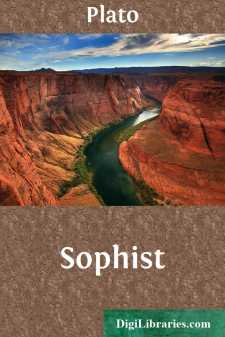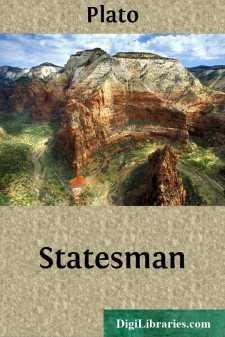Categories
- Antiques & Collectibles 13
- Architecture 36
- Art 48
- Bibles 22
- Biography & Autobiography 813
- Body, Mind & Spirit 142
- Business & Economics 28
- Children's Books 15
- Children's Fiction 12
- Computers 4
- Cooking 94
- Crafts & Hobbies 4
- Drama 346
- Education 46
- Family & Relationships 57
- Fiction 11828
- Games 19
- Gardening 17
- Health & Fitness 34
- History 1377
- House & Home 1
- Humor 147
- Juvenile Fiction 1873
- Juvenile Nonfiction 202
- Language Arts & Disciplines 88
- Law 16
- Literary Collections 686
- Literary Criticism 179
- Mathematics 13
- Medical 41
- Music 40
- Nature 179
- Non-Classifiable 1768
- Performing Arts 7
- Periodicals 1453
- Philosophy 64
- Photography 2
- Poetry 896
- Political Science 203
- Psychology 42
- Reference 154
- Religion 513
- Science 126
- Self-Help 84
- Social Science 81
- Sports & Recreation 34
- Study Aids 3
- Technology & Engineering 59
- Transportation 23
- Travel 463
- True Crime 29
Sophist
by: Plato
Description:
Excerpt
INTRODUCTION AND ANALYSIS.
The dramatic power of the dialogues of Plato appears to diminish as the metaphysical interest of them increases (compare Introd. to the Philebus). There are no descriptions of time, place or persons, in the Sophist and Statesman, but we are plunged at once into philosophical discussions; the poetical charm has disappeared, and those who have no taste for abstruse metaphysics will greatly prefer the earlier dialogues to the later ones. Plato is conscious of the change, and in the Statesman expressly accuses himself of a tediousness in the two dialogues, which he ascribes to his desire of developing the dialectical method. On the other hand, the kindred spirit of Hegel seemed to find in the Sophist the crown and summit of the Platonic philosophy—here is the place at which Plato most nearly approaches to the Hegelian identity of Being and Not-being. Nor will the great importance of the two dialogues be doubted by any one who forms a conception of the state of mind and opinion which they are intended to meet. The sophisms of the day were undermining philosophy; the denial of the existence of Not-being, and of the connexion of ideas, was making truth and falsehood equally impossible. It has been said that Plato would have written differently, if he had been acquainted with the Organon of Aristotle. But could the Organon of Aristotle ever have been written unless the Sophist and Statesman had preceded? The swarm of fallacies which arose in the infancy of mental science, and which was born and bred in the decay of the pre-Socratic philosophies, was not dispelled by Aristotle, but by Socrates and Plato. The summa genera of thought, the nature of the proposition, of definition, of generalization, of synthesis and analysis, of division and cross-division, are clearly described, and the processes of induction and deduction are constantly employed in the dialogues of Plato. The 'slippery' nature of comparison, the danger of putting words in the place of things, the fallacy of arguing 'a dicto secundum,' and in a circle, are frequently indicated by him. To all these processes of truth and error, Aristotle, in the next generation, gave distinctness; he brought them together in a separate science. But he is not to be regarded as the original inventor of any of the great logical forms, with the exception of the syllogism.
There is little worthy of remark in the characters of the Sophist. The most noticeable point is the final retirement of Socrates from the field of argument, and the substitution for him of an Eleatic stranger, who is described as a pupil of Parmenides and Zeno, and is supposed to have descended from a higher world in order to convict the Socratic circle of error. As in the Timaeus, Plato seems to intimate by the withdrawal of Socrates that he is passing beyond the limits of his teaching; and in the Sophist and Statesman, as well as in the Parmenides, he probably means to imply that he is making a closer approach to the schools of Elea and Megara....



